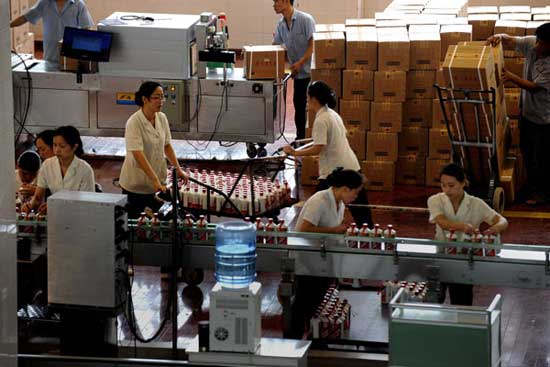The Qingxi Lake
The Qingxi Lake is an oddity – 50 kilometers long, yet less than 100 meters wide. Located in Suiyang County of Zunyi City, it is beautiful – though it was actually formed by man-made processes. At Qingxi, man has made beauty comparable to nature’s own hand – surely a rare occurrence.
Karst landforms, caves, and mountains follow the contours of the lake. It’s almost like it should always have been here, only Mother Nature forgot to add water. Tourists can hire a boat and float along the calm waters to admire the surrounding scenery.
The most beautiful time to visit the Qingxi Lake is after a rainstorm. Heavy downpour brings out an alluring mist in the water; rainbows arch out to frame nearby cliffs. The air is fresh and clean, and at night, cloudless skies fill with celestial splendor.
Jiudaomen is the wild side of the Qingxi Lake zone. The area features 13 enormous rock pillars that rise out of the flat earth. They are dotted with pines and cypress trees and rather resemble the “floating mountains” in James Cameron’s Avatar.
One excellent section on which to boat is midway up the lake in an 11.8-kilometer long, 20-meter wide canyon. Cliffs rise up on both sides to between 100 and 150 meters high. The slow cruise takes two to three hours. The water is clear in some parts, and ruffled in others. Nearby is a hotel complex should you wish to escape the city and stay for the night.
Cave Culture
The Shuanghe karst cave is enormous. So enormous, in fact, that domestic and international experts are still exploring it. They know it is at least 145 kilometers long, and contains three levels with eight large cave structures, 118 smaller ones, four subterranean rivers and 23 access routes. It is China’s longest and biggest cave group.
Of the explored areas, the evocative scenery has resulted in creative naming – Gypsum Cave, Water Curtain Cave, Lotus Cave, Sweet-scented Osmanthus Cave, Mountain King Cave, Cedar Tree Cave and others attest to some vivid imaginations on behalf of the first explorers.
The Sweet-scented Osmanthus Cave is a particular highlight. It has 5,000 square meters of helictite along its length of 500 meters – Asia’s largest helictite spectacle. The silvery formations create a wonderland as amazing as your imagination can conjure.
“Cave culture” has long been a facet of Guizhou society. The caves have played a part in human lives as early as 200,000 years ago when the cave-dwelling Tongzi people were discovered through to the modern record. In the Ming Dynasty philosopher Wang Yangming held lessons in the caves. During the war against Japanese aggression, Generals Zhang Xueliang and Yang Hucheng were exiled to the caves by Chiang Kai-shek for suggesting a united front with the Communists against the invaders. During the subsequent civil war, crop harvests were stored in the cool caves to ensure a stable food supply. The history continues.
 |
|
Workers packing Moutai at a workshop belonging to Kweichow Moutai Co in Zunyi city, in Southwest China’s Guizhou province.
|
Local Liquor
While in Zunyi, tasting the local tea is a must. When you’re done with the tea, you can move onto the many varities of local liquor. There are so many you probably won’t get through them all. One you must try is Moutai, perhaps China’s most famous – and certainly most expensive – drop. There are more than 100 registered liquor distillers in the Zunyi area, but only ten of them are recognized as top-tier.
The pure water of the Chishui River from its source in Chuxiong, Yunnan province is used to potent effect in Zunyi’s liquor industry. The Chishui is a tributary of the Yangtze, the longest river in Asia and the third-longest in the world. The Chishui is also known as Meijiu, or “Fine Liquor,” River, and its water has been used in making alcohol since time immemorial. “Chishui” itself means “red water,” a name that comes from rain water washing over the river’s muddy banks, which are reddish in color.
The Moutai liquor brand has a long history. In 1915 it entered the world stage when it won a silver medal at EXPOCOMER in Panama. The drink is incredibly popular in China to this day, and the best vintages fetch high prices.
Chinese liquor is growing in popularity worldwide. Throughout the country’s history, liquor has been a romantic symbol, much like wine in Europe. Poets have imbibed it and extolled its wonders. It is said Li Bai of the Tang Dynasty couldn’t pick up his brush without a drop of liquor first. The Preface to the Orchid Pavillion Collection, one of China’s early masterworks, is said to have been written entirely under the influence. Liquor is part of China’s heritage, and the best liquor comes from Zunyi. After a day spent marveling at the area’s Jurassic tree ferns, humbling cave complexes and tranquil lakes, kick back in your hotel and pour yourself a glass.
We recommend:
